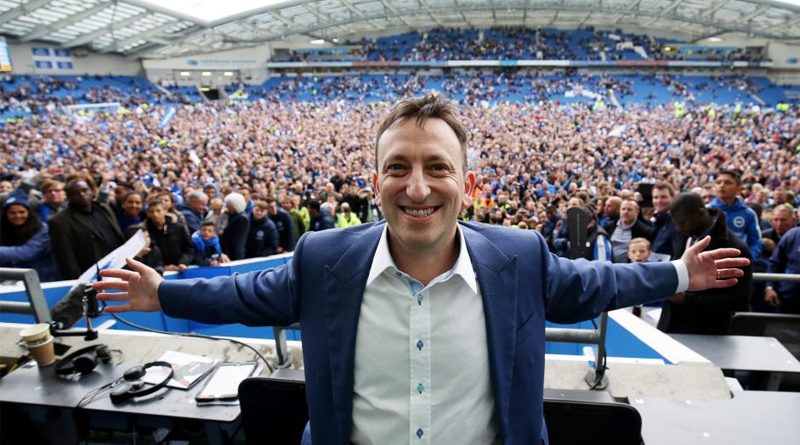Brighton’s profit powerplay: Redefining financial fair play
Brighton & Hove Albion recently announced profits of £122.8 million for the 2022-23 season, setting a new Premier League record.
What makes this figure even more remarkable is that it does not include the £115 million received from Chelsea for Moises Caicedo.
That highest figure ever for a British transfer will not show until the 2023-24 accounts. The Seagulls could in theory break their own record, posting an even bigger profit for the current campaign.
With Nottingham Forest and Everton deducted points for breaching profit and sustainability rules, 115 financial fair play charges hanging over Manchester City and clubs like Chelsea sweating on whether their accounts can comply, Brighton find themselves in an almost unique position going into the summer transfer window.
Most of the Premier League will be restricted in what it can spend until the next accounting period commences on July 1st 2024. The Albion meanwhile have no such worries, giving them a potential advantage in the market.
Here is how Brighton and their profit powerplay are redefining financial fair play.
The Record-Breaking Numbers
The headline number is obviously that £122.8 million, setting a new Premier League profit record after tax. Brighton banked £133 million before tax, a figure only beaten in English football by the £139 million profit pre-tax of Spurs in 2017-18.
Not only do the Albion benefit from top class player recruitment, but they also have pretty sound tax advice by the looks of things.
What are the driving forces behind this windfall? Premier League broadcast contracts remain a huge source of income for every club. If you ignore player sales, 75 percent of Brighton’s income is television money – £155.2 million.
As for player sales, the Albion brought in a staggering £121.4 million in transfer income along with £23.4 million compensation for Graham Potter and his coaching team joining Chelsea.
If Brighton had not sold a single player in 2022-23 and kept Potter, they would have lost £22 million instead of setting record breaking profits.
Player Sales: The Golden Goose
In amongst the somewhat complicated world of amortisation and book value, the Albion are able to turn significant profits thanks to their ability to find cheap players with potential, develop them into stars and sell them for much bigger fees than they paid.
Just 12 months after arriving for £15 million from Getafe, Marc Cucurella joined Chelsea for £62 million. Alexis Mac Allister signed for £7.5 million, left for £35 million. Leandro Trossard cost £17 million, departed for £25 million. Yves Bissouma bought for £15 million, sold for £25 million.
Brighton were even able to move on a player like Neal Maupay – who became surplus to requirements at the Amex – for a profit to Everton.
The Albion then reinvest that money in another set of young players to develop, with the aim of selling those on in three to five years. And so the wheel keeps turning.
Premier League Profits Impact Online Betting Odds
As well as a continued focus on potential talents, owner Tony Bloom has hinted at a potential change in approach going into the summer transfer window.
Bloom wants Brighton to push higher up the table, becoming European regulars after their first jaunt into the Europa League in 2023-24.
To do that, he is apparently willing to spend greater money on more established players. There will never be a better time for the Albion to do so, with the rest of the Premier League unable to outlay much and potentially needing to sell to meet financial fair play.
And so comes the ultimate Brighton profit powerplay – using their new-found financial might in the world of profit and sustainability rules to sign players who they would previously have been outbid, strengthening their squad and stealing a march back into the top six and maybe even beyond.
As the club’s financial muscle flexes, odds-makers and sportsbooks are recalibrating their projections, recognizing Brighton’s newfound ability to attract top talent and sustain a prolonged period of success.
This influx of cash could potentially disrupt the established Premier League hierarchy, leading to fluctuations in betting markets as bingo sites uk and bookmakers adjust to Brighton’s elevated status.
Sustainability and Self-Reliance
Brighton securing record breaking profits of £122.8 million is not only good news for their power in the transfer market. It also helps reduce the reliance on Bloom with the aim of making the club more self-sustainable.
Since taking over in 2009, Bloom has pumped around half a billion pounds into the Albion. Alongside player acquisition, that money has been spent on building the Amex and the American Express Elite Football Performance Centre.
2022-23 was the first time in his 14 years as owner that Bloom received any sort of repayment for the loans and investments which have taken Brighton from League One strugglers to playing AEK Athens, Marseille and Ajax in Europe.
He took back £33.2 million, reducing the amount the club owed him in loans from £406.5 million to just £373.3 million. A further £90 million has been invested in shares.
Financial Fair Play Rewritten
The success story at Brighton can have far-reaching consequences across the Premier League and beyond in terms of clubs changing their approach to recruitment and transfer business.
Some have tried to take a shortcut by simply poaching staff from the Albion in an attempt to copy the way Brighton do business.
Chelsea (of course) have lured two Brighton heads of recruitment to Stamford Bridge in the space of 18 months; first taking Paul Winstanley and then approaching his replacement at the Amex, Sam Jewell.
Newcastle United also believed they were getting the secrets to the Seagulls’ success when making Dan Ashworth their technical director.
What those clubs failed to realise is that only one person knows how Brighton’s data and algorithms all fit together to identify the next Cucurella, Mac Allister or Caicedo. That man is Bloom and he is not likely to give anyone else the secret.
Other clubs appear to be waking up to this fact and so are putting in place their own data-driven strategies and looking in far flung corners of the world for talent.
Whether anyone can get close to copying the Albion model remains to be seen. What is not in doubt is that Brighton have mastered the rules of financial fair play, soaring to sixth place in the Premier League ahead of clubs with vastly superior resources at the same time as making record profits.




